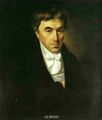Template:Selected anniversaries/December 22: Difference between revisions
No edit summary |
No edit summary |
||
| Line 30: | Line 30: | ||
File:Giacomo Puccini.jpg|link=Giacomo Puccini (nonfiction)|1858: Composer [[Giacomo Puccini (nonfiction)|Giacomo Puccini]] born. He will be called "the greatest composer of Italian opera after Verdi". | File:Giacomo Puccini.jpg|link=Giacomo Puccini (nonfiction)|1858: Composer [[Giacomo Puccini (nonfiction)|Giacomo Puccini]] born. He will be called "the greatest composer of Italian opera after Verdi". | ||
||Otto Ludwig Hölder (b. December 22, 1859) was a German mathematician. He will discover Hölder's inequality, a fundamental inequality between integrals and an indispensable tool for the study of Lp spaces. Pic. | |||
||1867 – Jean-Victor Poncelet, French mathematician and engineer (b. 1788) | ||1867 – Jean-Victor Poncelet, French mathematician and engineer (b. 1788) | ||
Revision as of 06:00, 10 April 2018
1550: Philosopher and academic Cesare Cremonini born. His work will promote rationalism (against revelation) and Aristotelian materialism (against the dualist immortality of the soul) inside scholasticism.
1551: Explorer Cornelis de Houtman publishes "The Legend of Neptune Slaughter, a Tale of Monstrous Disaster from Beyond the Islands and the Oceans of the Furthest East."
1732: Inventor, engineer, and businessman Richard Arkwright born. Later in his life Arkwright will be known as the "father of the modern industrial factory system."
1765: Mathematician Johann Friedrich Pfaff born. He will work on partial differential equations of the first order Pfaffian systems, as they are now called, which will become part of the theory of differential forms.
1858: Composer Giacomo Puccini born. He will be called "the greatest composer of Italian opera after Verdi".
1894: The Dreyfus affair begins in France, when Alfred Dreyfus is wrongly convicted of treason.
1920: Lecture by monster ends in riot.






